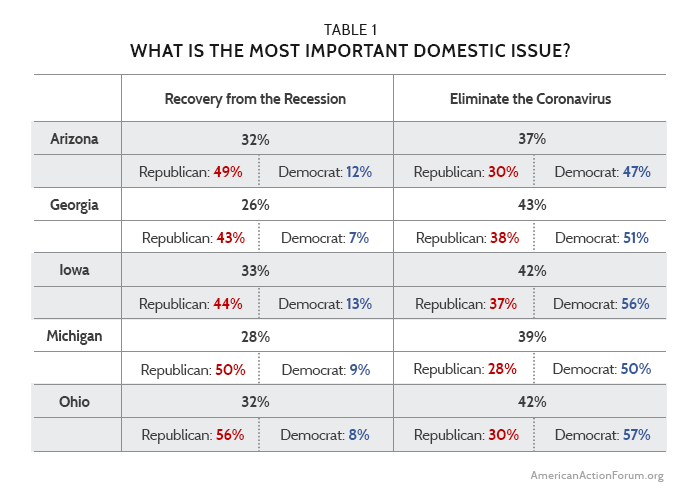Insight
September 24, 2020
Policy Priorities and the Election: Evidence from Five States
Overview
The American Action Forum (AAF) has undertaken a series of reviews and comparisons of the campaign policy platforms of President Trump and former Vice President Biden. What issues do voters care about most? What policies will they support? Reject?
To investigate these issues, AAF commissioned state-level polls in Arizona, Georgia, Iowa, Michigan, and Ohio. In addition to questions regarding the political context, the polls examined voters’ attitudes toward the coronavirus pandemic, additional pandemic aid spending, government spending and taxes in general, debt, labor issues, climate change, health care, tech regulation, and other policy topics. The key findings are as follows.
- The sharp partisan divide in politics spills over to nearly every policy issue as well. For example, recovering from the recession and eliminating the coronavirus are nearly tied as the most important domestic issue, but the former is a runaway leader among Republicans and the latter among Democrats.
- There is no strong support for reforming entitlements, although in three of the five states, voters prefer a mix of spending cuts and tax increases to doing nothing.
- In states where asked, voters cite costs as their primary health care concern, are positive about Right to Work laws, and are hopeful that their financial situation will improve over the next year.
- On a bipartisan basis, there is opposition to the government regulating the content of social media, but at the same time a notable sentiment that big tech companies are under-regulated.
Methods and Data
The polls were conducted at the end of August and in the first week of September. For each of the states (Arizona, Georgia, Iowa, Michigan, and Ohio) the polling firms produced three products: an overview and summary, a tabulation of the responses to each question, and a set of cross-tabulations that permit one to examine patterns in the responses. These documents contain sample sizes, polling dates, and other documentation; they can be found here:
AAF intends to repeat these polling efforts in early October to investigate whether there is a trend in the policy interests and an impact from the first presidential debate planned for late September as well as the open Supreme Court seat.
Key Findings
One of the striking features of the polling results is the degree to which the partisan political divide is reflected in the policy preferences. The first policy question was to identify the most pressing domestic policy issue. As shown in Table 1, the leading response was closely divided between “Recovery from the Recession” and “Eliminate the Coronavirus.” While the latter was the leading issue in all five states generally, this result is reversed among Republicans; in all five states, economic recovery outranked eliminating the coronavirus for GOP voters. In sharp contrast, eliminating the coronavirus was the top issue for Democrats. Indeed, recovery from the recession at times trailed fighting racial and social injustice and inequality and fighting climate change among Democrats.
There was a similar pattern when asked about whether the greater danger was opening too soon (Democrats) or incurring economic damage by locking down too long (Republicans), whether additional stimulus spending was worth incurring another $1 trillion in national debt (Democrats supported; Republicans on the whole opposed), and whether candidate Biden should raise more taxes (Democrats) or cut promised spending (Republicans) to make his plans add up – although in Ohio voters in both parties indicated he should cut his spending. Also in Ohio, there was a significant partisan split when voters were asked about the impact of Biden’s proposed tax increase on the economy, with Republicans strongly believing it would be harmful and Democrats believing it would helpful.
While there was no strong support for reforming entitlements, voters in three of the five states narrowly preferred a mix of spending cuts and tax increases to doing nothing. Also, a large majority in each state favored reducing the debt with either spending cuts or both spending cuts and tax increases over doing nothing. There was broad bipartisan support for allowing employees to choose whether or not they want to participate in labor unions, indicating wide support for Right to Work laws. This preference held in both Georgia, a traditional Right to Work stronghold, as well as in Ohio and Michigan, states traditionally more favorable to unions.
Another somewhat contradictory area of bipartisan agreement was attitudes toward big tech. Across the board, respondents opposed the idea of having the government regulate the content of social media platforms. At the same time, there was notable agreement that big tech companies are under-regulated.











